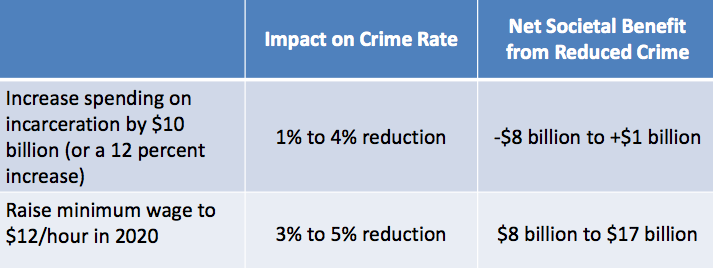Some might say that
increasing the minimum wage might hurt the middle class, however that is not
necessarily the case. Research indicates that increasing the minimum wage
reduces the income inequality between the middle class and lower income
families. It also shows that increasing the minimum wage does not have an
impact on the middle class families at all. Increasing the minimum wage
actually benefits the middle class.
According
to Oren M. Levin-Waldman, the author of How Raising the Minimum Wage Would
Boost the Middle Class, "Higher pay at the bottom of the scale
ripples upward, improving purchasing power for everybody" (Waldman). This
means that if wages are increased the lower income workers will improve the
purchasing power for middle class workers as well. Also the reason that income inequality has
been increasing lately and the middle class has been shrinking is because of
wages that remain stagnant. According to Waldman," increasing the minimum
wage would go far toward reversing that trend (Waldman). This means that increasing the minimum wage decreases
income inequality and if the minimum wage is not increased the gap between the
lower and middle class increases. The other side might also say that increasing
the minimum wage will result in job losses for newly hired and unskilled workers.
However, this is not accurate because minimum wage increases have little to no
negative effect on employment because there have been studies done by more than
600 economists, including seven Nobel prize winners that show that the
employment levels stay the same regardless of whether the minimum wage is
increased or not. There has also been some academic research that shows that
higher wages sharply reduce employee turnover which can reduce employment and
training costs.
The opposing side
of this argument might also say that that increasing the minimum wage will
cause people to lose their jobs. This is also not correct because research has
been conducted by economists that suggests that a minimum wage increase could
have a small stimulative effect on the economy. The reason for this is that as
low- wage workers spend their additional earnings, they raise demand and job
growth, and provide help in developing more jobs. Another argument that a
person who is against raising the minimum wage might say is that increasing the
minimum wage is bad for the economy. This opposing argument is also not correct
because since 1938, the federal minimum wage has been increased 22 times and
for more than 75 years the real GDP per capita has steadily increased, even
when the minimum wage had been raised. These facts indicate that the increasing
the minimum wage does not necessarily hurt the economy. This is the reason why
the minimum should be increased to $15 per hour by 2019.
Works Cited:
Levin-Waldman, Oren M. How Raising the Minimum Wage Would Boost the Middle Class13 Feb. 2014, www.governing.com/gov-institute/voices/col-raising-minimum-wage-boost-middle-class.html. Accessed 9 Nov. 2016
Minimum Wage Mythbusters , United Sates Department Of Labor, https://www.dol.gov/featured/minimum-wage/mythbuster. Accessed 10 Nov. 2016.
